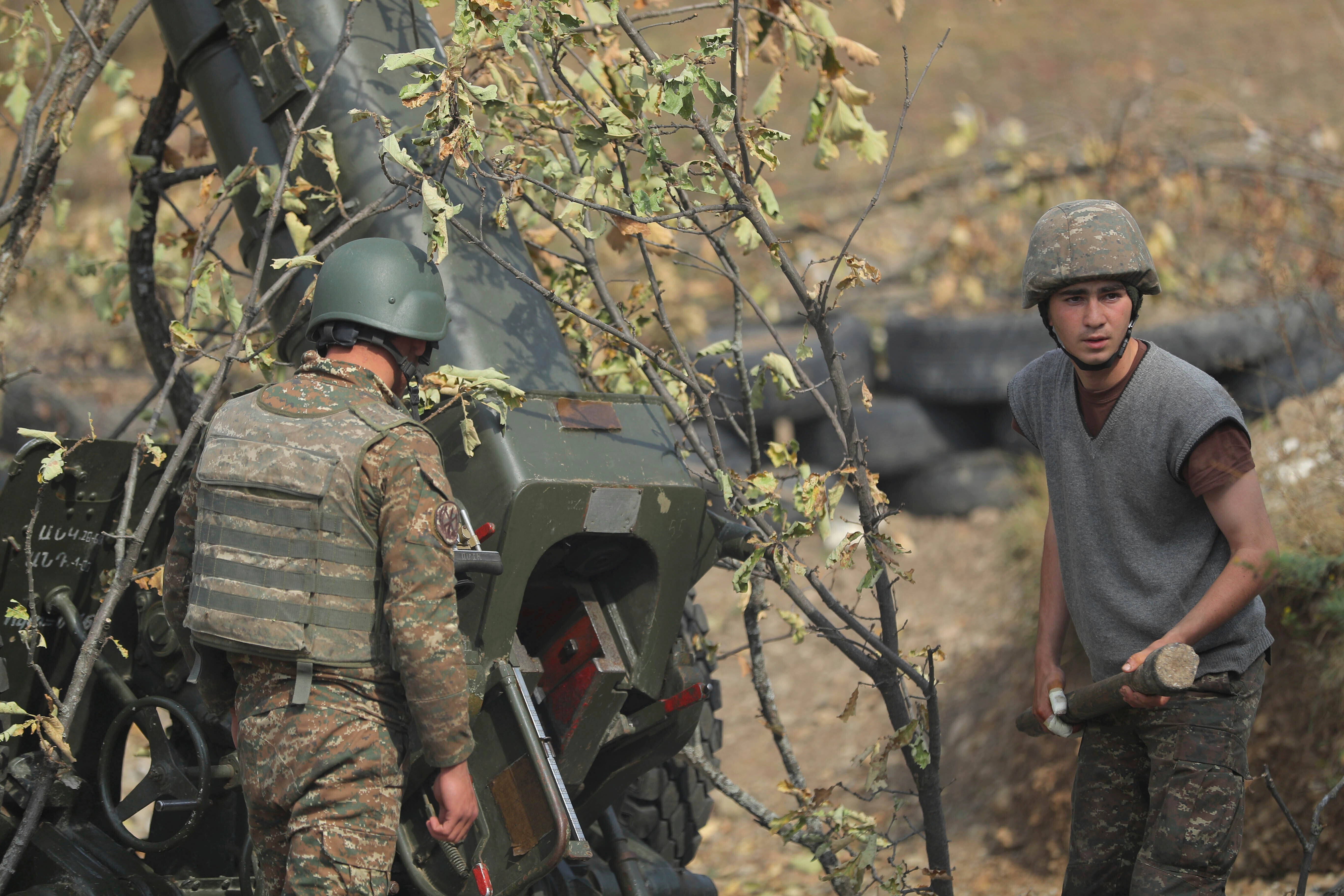Nagorno-Karabakh conflict increases as Azerbaijan accuses Armenia of firing several missiles
Heavy fighting over Nagorno-Karabakh is continuing with Armenia and Azerbaijan trading blame for new attacks

Your support helps us to tell the story
From reproductive rights to climate change to Big Tech, The Independent is on the ground when the story is developing. Whether it's investigating the financials of Elon Musk's pro-Trump PAC or producing our latest documentary, 'The A Word', which shines a light on the American women fighting for reproductive rights, we know how important it is to parse out the facts from the messaging.
At such a critical moment in US history, we need reporters on the ground. Your donation allows us to keep sending journalists to speak to both sides of the story.
The Independent is trusted by Americans across the entire political spectrum. And unlike many other quality news outlets, we choose not to lock Americans out of our reporting and analysis with paywalls. We believe quality journalism should be available to everyone, paid for by those who can afford it.
Your support makes all the difference.Heavy fighting over Nagorno-Karabakh continued Thursday with Armenia and Azerbaijan trading blame for new attacks, hostilities that raised the threat of Turkey and Russia being drawn into the conflict.
Azerbaijan's Defense Ministry accused Armenia of firing several ballistic missiles from its territory at the Azerbaijani cities of Gabala, Siyazan and Kurdamir, which are located far from the area of fighting in Nagorno-Karabakh. It said there were no casuaLties.
The Armenian military rejected the claim as a “cynical lie.”
Nagorno-Karabakh lies within Azerbaijan but has been under the control of ethnic Armenian forces backed by Armenia since a war there ended in 1994. The current fighting that started on Sept. 27 already has killed hundreds, marking the biggest escalation in the conflict since the war’s end.
Two Russia-brokered cease-fires collapsed instantly after taking effect, and the warring parties have continued to exchange blows with heavy artillery, rockets and drones.
Azerbaijani President Ilham Aliyev has said that to end hostilities Armenian forces must withdraw from Nagorno-Karabakh. He has insisted that Azerbaijan has the right to reclaim its territory by force since nearly three decades of international mediation hasn't yielded progress.
Russia, the United States and France have co-chaired the so-called Minsk Group set up by the Organization for Security and Cooperation in Europe to mediate in the conflict, but their attempts to negotiate a political settlement have stalled.
Armenian Prime Minister Nikol Pashinian retorted Wednesday that Azerbaijan’s aggressive stance effectively amounts to the demand that the Nagorno-Karabakh region surrenders, leaving no room for diplomacy.
“There is no way now to settle the Nagorno-Karabakh issue through diplomacy,” Pashinian said, emphasizing that “there is no Armenia without Nagorno-Karabakh.”
The Armenian leader accused Turkey of encouraging Azerbaijan's attack on Nagorno-Karabakh and blocking any attempt at a cease-fire.
Turkey, a NATO member, has strongly defended its ally’s right to reclaim its lands by force, and jockeyed for a higher-profile diplomatic role in the conflict. Strike drones and long-range rocket systems supplied by Turkey in previous years have given the Azerbaijani military a strong edge on the battlefield.
Turkish Vice President Fuat Oktay warned Wednesday that Ankara won't hesitate to send troops to Azerbaijan if such a request is made by Baku.
“Azerbaijan and Turkey have agreements on military cooperation,” he said on CNN Turk. “ If Armenia takes unexpected steps and there is a request from Baku to send troops, Turkey will not hesitate.”
Russia, which has a military base in Armenia and a security pact obliging Moscow to protect its ally, has been involved in a delicate balancing act, trying to also maintain good ties with Azerbaijan and avoid a showdown with Turkey.
A Russian lawmaker, Konstantin Zatulin, argued Thursday that Moscow should intervene militarily to protect Armenia, but the Kremlin dismissed the call.
Asked about Zatulin's statement, Russian President Vladimir Putin's spokesman, Dmitry Peskov, responded that “there is no alternative to a peaceful settlement."
Commenting on Turkey's clamoring for a bigger mediation role in the conflict, Peskov said that such mediation must be accepted by both warring parties. Armenia has categorically rejected Turkey's involvement because of its support for Azerbaijan.
___
Associated Press writers Vladimir Isachenkov in Moscow, and Aida Sultanova in London, contributed to this report.